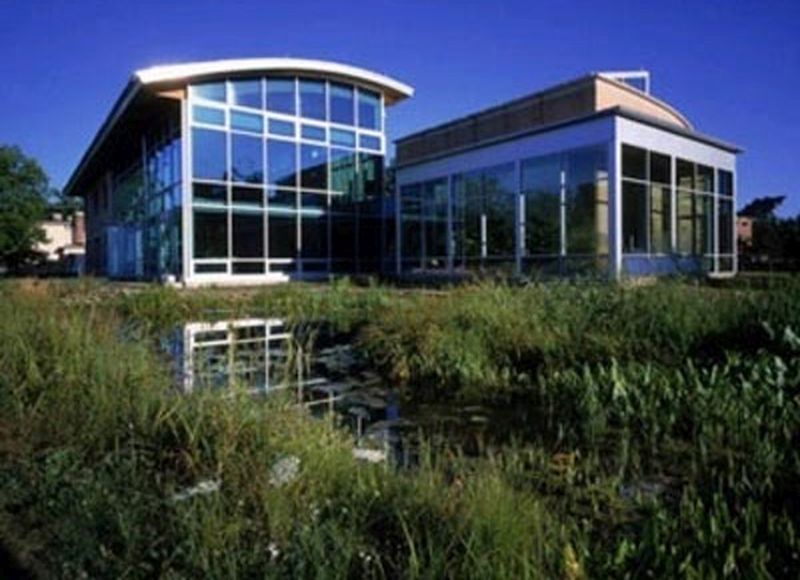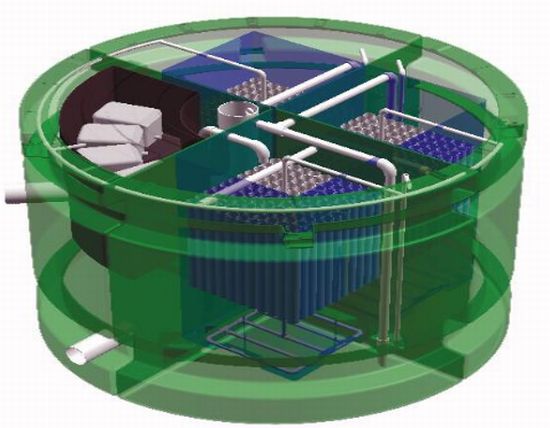Humans have contributed to global warming which has led to catastrophic climate change in many parts of the world. People have to work for the benefit of the planet and reduce emission in whatever way they can. Colleges have a responsibility to instill green lifestyle among the young and impressionable students by undertaking green moves which can help to lower the global temperature. Here are some green initiatives for college campuses which can be implemented which can lower the impact of climate change:
Read More: 8 Reasons you should take climate change more seriously
10 – Green initiatives for college campuses
1. Green buildings
 New buildings in college campuses can be constructed in accordance to sustainability principles and methods. Solar panels, water recycling, rain barrels and recycled materials should be used for construction. Gray water system and passive lighting should be used. In older buildings, green initiatives for college campuses can be retrofitted to lessen the use of conventional energy for heating and cooling purposes. The dorms can have at least a few solar panels as an environmentally friendly measure.
New buildings in college campuses can be constructed in accordance to sustainability principles and methods. Solar panels, water recycling, rain barrels and recycled materials should be used for construction. Gray water system and passive lighting should be used. In older buildings, green initiatives for college campuses can be retrofitted to lessen the use of conventional energy for heating and cooling purposes. The dorms can have at least a few solar panels as an environmentally friendly measure.
The aim of colleges should be to work towards attaining LEED certification/rating. This is not an easy task and the effort should be to achieve this goal within a specified time.
2. Environmental degrees
Colleges must teach subjects which would help the students to understand and work in the field of environmental conservation. Sustainable agriculture methods can help future farmers to farm without the use of pesticides and chemicals. Natural resources conservation and environmental humanities are examples of programs which can empower young people to innovate and implement eco-friendly strategies.
Sustainable curricula can also be in the form of electives or individual courses which focus on environment. Professors should help with homework for students so that they have the opportunity to allocate time for such courses. This would help students who follow other degrees to study about individual topics which might or might not be related to their degree. If professors are not helpful, they might have to opt for a research paper writing service.
Imparting knowledge about sustainability and climate change is one of the green initiatives for college campuses which all colleges in the world have to carry out.
3. Transportation
 Transportation is responsible for approx 27% of all the greenhouse emissions in US, according to EPA. This amount can be reduced by college campuses encouraging vehicles which have low or zero emissions. Walking and cycling/biking, car pooling, public transportation around campuses should be encouraged.
Transportation is responsible for approx 27% of all the greenhouse emissions in US, according to EPA. This amount can be reduced by college campuses encouraging vehicles which have low or zero emissions. Walking and cycling/biking, car pooling, public transportation around campuses should be encouraged.
Students can make green campus project which is to spread awareness about eco-friendly transportation, not only on campus, but also outside. These activities will spur the interest of students towards a green lifestyle. Walking, cycling etc are healthy exercises which will keep them healthy.
Shuttle buses which run on biodiesel or other kind of fuels are being seen on campuses all over the world. There is no emission from these vehicles, and they are quite useful in transporting students and professors from one part of the campus to another. Shuttles are environmentally friendly transport that can be an example to students to continue this kind of transport after they have finished their studies.
4. Energy supply
Colleges need a lot of energy to run their services. One of the green initiatives for college campuses is to start using sustainable energy to supplement their energy needs. Solar panels, water power and wind power projects can be an investment which would pay off in time.
5. Composting program
 A green campus project could be a composting project. This program should be more than just composting the waste food from the dining halls and kitchen service. Students must be aware about contributing towards the composting project when they eat in their own dorms too.
A green campus project could be a composting project. This program should be more than just composting the waste food from the dining halls and kitchen service. Students must be aware about contributing towards the composting project when they eat in their own dorms too.
6. Colleges should reimburse for green efforts
Some green-minded colleges offer reimbursements in the form of mini discounts in the cafeteria, if the students bring utensils such as mugs and plates for the cafeteria food. Using their own utensils would reduce single use disposables which pollute the planet. Students can also be offered discounts for purchasing recycled paper or recycled paper products.
7. Organic farming
 Most colleges have huge tracts of land. A college which is serious about going green should cultivate organic farming, and using the produce in their kitchens. This kind of sustainability activities might entail the participation of students who might learn how to create healthy meals, right from growing pesticide free, chemical free food. Activities such as organic gardens will also teach students how to create their own organic farms/gardens later in life. Thus, one of the green initiatives for college campuses could be organic farming.
Most colleges have huge tracts of land. A college which is serious about going green should cultivate organic farming, and using the produce in their kitchens. This kind of sustainability activities might entail the participation of students who might learn how to create healthy meals, right from growing pesticide free, chemical free food. Activities such as organic gardens will also teach students how to create their own organic farms/gardens later in life. Thus, one of the green initiatives for college campuses could be organic farming.
8. Recycling
There should be recycling bins which should be kept in abundance all over the campus, as it would make it easier for students to give materials for recycling. Refills of pens, paper, cardboard boxes, clothes, plastic items – colleges should encourage recycling to the utmost.
9. Water bottle refilling stations
 One of the most important and best green initiatives for college campuses is to install water bottle refilling stations. Plastic water bottles are one of the most hazardous items for the environment. These have choked up the oceans and the landfills creating a huge problem for the planet. Plastic takes hundreds of years to break down, and remains in the environment for years.
One of the most important and best green initiatives for college campuses is to install water bottle refilling stations. Plastic water bottles are one of the most hazardous items for the environment. These have choked up the oceans and the landfills creating a huge problem for the planet. Plastic takes hundreds of years to break down, and remains in the environment for years.
Students can buy steel water bottles which they can carry around and fill from time to time from the refilling stations. This would drastically reduce the use of disposable or single use plastic bottles. This habit of carrying water in reusable bottles will lower the number of plastic bottles being used in campus and off campus.
10. Cutting ties from companies which deny/dispute climate change
Many colleges, such as Yale, Stanford, California University and Barnard College have started to partially or fully divest from companies which deny that climate change is occurring, or that human endeavors are responsible for it. One of the sustainability activities which is important to send the message out is to cut all ties from offending companies. Barnard College was the first college in America to completely divest in the year 2017, pulling out its 18 million dollars from fossil fuels and investing in sustainability friendly industries.
Colleges must take proactive action to inculcate green living ideas in students by taking eco friendly steps to protect the environment. Eco-friendly curricula, recycling, reusing, suing LED lights, reducing water usage and other initiatives will form green habits in students which they can continue even after they complete their studies.
Some examples of Eco-friendly college campuses
1. Oberlin College
 Though not as large as many other universities around, Oberlin College has made huge efforts to reduce its carbon footprint. Students, together with CityWheels, took the initiative of creating a car pooling program to reduce the number of cars on the road. The college also created a monitoring system that shows students how much energy and water they use in real time. The feather on the cap of the college has to be the Adam Joseph Lewis Center for Environmental Studies that uses geothermal heating, recycled materials and a green roof.
Though not as large as many other universities around, Oberlin College has made huge efforts to reduce its carbon footprint. Students, together with CityWheels, took the initiative of creating a car pooling program to reduce the number of cars on the road. The college also created a monitoring system that shows students how much energy and water they use in real time. The feather on the cap of the college has to be the Adam Joseph Lewis Center for Environmental Studies that uses geothermal heating, recycled materials and a green roof.
2. Evergreen State College
 The Evergreen State College has made big efforts to live up to its moniker. Its food needs are met through the use of an organic farm with proceeds from leftover food sold to the campus food service going to farm projects. Massive composting is also undertaken by the college. And that’s not all. The EPA once voted the college eighth in the United States in recognition of its green power purchasing efforts.
The Evergreen State College has made big efforts to live up to its moniker. Its food needs are met through the use of an organic farm with proceeds from leftover food sold to the campus food service going to farm projects. Massive composting is also undertaken by the college. And that’s not all. The EPA once voted the college eighth in the United States in recognition of its green power purchasing efforts.
As part of this college’s Practice of Sustainable Agriculture program, students do hands on work in the organic farm. Sustainable farming is farming of the present. It teaches students the importance of limiting their impact on the environment.
Maintaining a healthy food system is something that the college takes seriously. Some of the food grown on the 5-acre plot is given to local food banks.
3. College of the Atlantic

Sustainability is reflected through every part of this college. The school was originally founded by people who knew the importance of caring for the environment.
Dorms were built with sustainability in mind and to this day, the college strives to do more and more to reduce their impact. There have been multiple student-assisted projects to raise wind turbines in order to harness wind energy. In 2011 students created an electric car with solar panels on it.
The first college in the United States to pledge carbon neutrality, College of the Atlantic strives to avoid or reduce carbon emissions that may be generated due to campus activities including commuting to and from the college.
4. Middlebury College
 Located in Vermont, students of Middlebury College were responsible for making the board of trustees set 2016 as a target for the college to become carbon neutral. Thermostats in the campus are turned down to save energy and the college also advocates using public transport instead of private vehicles to commute to and from it.
Located in Vermont, students of Middlebury College were responsible for making the board of trustees set 2016 as a target for the college to become carbon neutral. Thermostats in the campus are turned down to save energy and the college also advocates using public transport instead of private vehicles to commute to and from it.
5. EARTH University
 Costa Rica’s EARTH University is dedicated to educating students who can work for sustainable development and environmental service. The college’s four-year agronomy degree will ensure that technology makes use of plants for food and fuel, leaving the need for non-renewable sources of energy far behind.
Costa Rica’s EARTH University is dedicated to educating students who can work for sustainable development and environmental service. The college’s four-year agronomy degree will ensure that technology makes use of plants for food and fuel, leaving the need for non-renewable sources of energy far behind.
6. Harvard University
 A leader in education, Harvard University makes use of biodiesel to fuel its college buses as well as maintaining a green cleaning service. This service ensures that products used are environment friendly and procedures must comply with environmental safety regulations. In fact, the Facilities Maintenance Operations of Harvard recently became Green Seal certified.
A leader in education, Harvard University makes use of biodiesel to fuel its college buses as well as maintaining a green cleaning service. This service ensures that products used are environment friendly and procedures must comply with environmental safety regulations. In fact, the Facilities Maintenance Operations of Harvard recently became Green Seal certified.
7. California State University, Chico
 Students of California State University have come up with innovative projects to go green. The vending machines on campus have sensors installed that put the machines in sleep mode when not in use. Students and faculty are encouraged to take the stairs for at least a day during a semester and avoid using elevators. The college, meanwhile, has solar panels atop certain rooftops and LEED-certified buildings.
Students of California State University have come up with innovative projects to go green. The vending machines on campus have sensors installed that put the machines in sleep mode when not in use. Students and faculty are encouraged to take the stairs for at least a day during a semester and avoid using elevators. The college, meanwhile, has solar panels atop certain rooftops and LEED-certified buildings.
8. Leeds University
 Leeds University’s students are actively involved in environmental efforts. Green Streets is an initiative taken to ensure reuse and recycle of items generated by student houses and student halls. Purchasing recycled goods is also favored by this UK university and its waste management practices have even earned it a Green Gown Award.
Leeds University’s students are actively involved in environmental efforts. Green Streets is an initiative taken to ensure reuse and recycle of items generated by student houses and student halls. Purchasing recycled goods is also favored by this UK university and its waste management practices have even earned it a Green Gown Award.
9. Yale University
 Yale University has taken big steps to make its mark in the green world. By 2020, it hopes to reduce carbon emissions to 10% as well as use renewable sources of energy. It even plans to help China reduce its greenhouse gas emissions, which is no mean feat. Leeds was named among the top ‘20 coolest schools’ for its green efforts by The Princeton Review’s Green Honor Roll.
Yale University has taken big steps to make its mark in the green world. By 2020, it hopes to reduce carbon emissions to 10% as well as use renewable sources of energy. It even plans to help China reduce its greenhouse gas emissions, which is no mean feat. Leeds was named among the top ‘20 coolest schools’ for its green efforts by The Princeton Review’s Green Honor Roll.
10. University of Maryland
 Students at the University of Maryland are working hard to ensure that they make a difference by approving a hike in fees so that the college can make use of green energy. If implemented, then this will make it the biggest higher education buyer of clean energy in the entire United States. It is also undertaking a project involving motion sensors that will shut down office machines when not in use.
Students at the University of Maryland are working hard to ensure that they make a difference by approving a hike in fees so that the college can make use of green energy. If implemented, then this will make it the biggest higher education buyer of clean energy in the entire United States. It is also undertaking a project involving motion sensors that will shut down office machines when not in use.
11. Warren Wilson College, Asheville, N.C.
 Here is a college that takes their sustainability to heart. Sustainability is weaved into the fabric of Warren Wilson College.
Here is a college that takes their sustainability to heart. Sustainability is weaved into the fabric of Warren Wilson College.
They have multiple programs going to reduce their impact on the environment. These programs include organic farms, geothermal systems, energy star appliances, solar lights, and much more. They are determined to leave a lasting impression on the students who attend the college. They were also one of the first colleges to have a LEED certified residence hall for students.
12. University of California, Santa Cruz
 Because of statewide droughts, the University of California has implemented different ways to conserve water. The campus has redone its entire system in order to be more efficient. They have installed high efficiency toilets and showers as well as greywater systems.
Because of statewide droughts, the University of California has implemented different ways to conserve water. The campus has redone its entire system in order to be more efficient. They have installed high efficiency toilets and showers as well as greywater systems.
Another way they do this is by composting food. It saves them around 30,000 gallons a month.
13. University of New Hampshire, Durham, N.H.
 Energy fueled by trash? It is not unheard of, but then add into the equation a college campus that serves more than 13,000 and you have an interesting story. The University of New Hampshire, on top of being a great school, is committed to sustainable practices.
Energy fueled by trash? It is not unheard of, but then add into the equation a college campus that serves more than 13,000 and you have an interesting story. The University of New Hampshire, on top of being a great school, is committed to sustainable practices.
In 2009, the university created a partnership with a local landfill and put in place a system that would provide 85% of the energy needs of the school. Recently they have built a high-tech composting facility that produces quality compost and captures heat.
Final Words
As the world awakens to the fact that time isn’t exactly on our side, experts and laymen alike are trying to come up with solutions to ease the energy crisis, pollution and water concerns. Even for collage campuses it is no mean task taking on such challenges. So, we need to appreciate their efforts and take inspiration from them to make our own college campuses sustainable.



